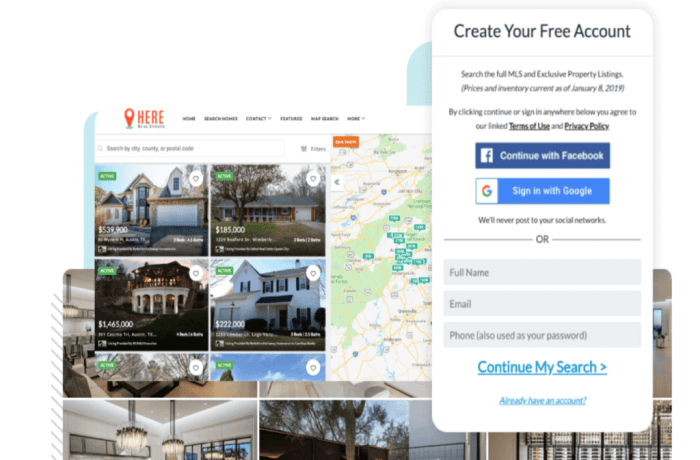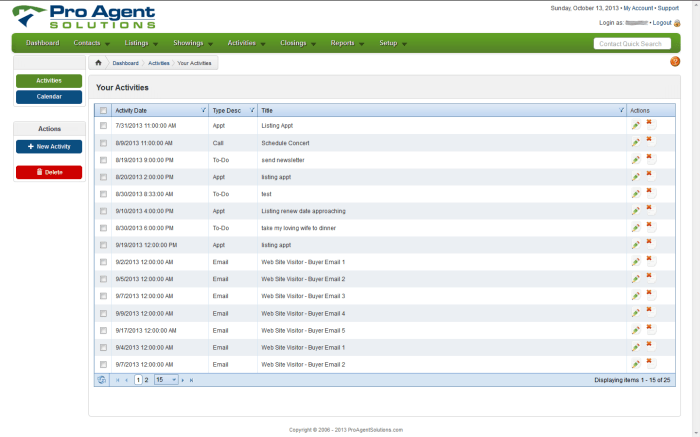In today’s competitive real estate market, efficiency and organization are paramount. Real estate broker CRM software offers a powerful solution, streamlining operations and boosting productivity. This comprehensive guide explores the features, benefits, and considerations involved in choosing the right CRM for your brokerage. We’ll delve into key functionalities, address frequently asked questions, and provide insights to help you make an informed decision.

Source: quicksprout.com
Understanding the Power of Real Estate CRM Software
A Customer Relationship Management (CRM) system specifically designed for real estate brokers acts as a central hub for all your client and business interactions. It’s more than just a contact list; it’s a dynamic tool that facilitates lead generation, nurturing, transaction management, and team collaboration. By centralizing information and automating tasks, a robust real estate CRM significantly enhances efficiency and profitability.
Key Features of Top-Tier Real Estate CRM Software, Real estate broker crm software
- Contact Management: Store comprehensive client profiles, including contact details, transaction history, communication logs, and preferences. This ensures personalized communication and efficient follow-up.
- Lead Management: Capture and qualify leads from various sources (website forms, open houses, referrals), track their progress through the sales funnel, and automate follow-up communication.
- Transaction Management: Manage deals effectively, track important dates (closing dates, inspections, etc.), and maintain detailed records of each transaction.
- Marketing Automation: Automate email campaigns, drip marketing sequences, and other marketing activities to nurture leads and stay top-of-mind with clients.
- Team Collaboration: Facilitate seamless communication and collaboration among agents, providing shared access to client information and task management tools.
- Reporting and Analytics: Gain valuable insights into your business performance, track key metrics (conversion rates, lead sources, etc.), and identify areas for improvement.
- Integration with other tools: Seamless integration with other essential real estate tools such as IDX websites, MLS systems, and marketing platforms.
- Mobile Accessibility: Access your CRM anytime, anywhere, through mobile apps, enabling on-the-go management of your business.
- Customizable Workflows: Tailor your CRM to fit your specific business processes and workflows, optimizing efficiency and productivity.
Benefits of Implementing a Real Estate Broker CRM
Investing in a real estate CRM offers numerous advantages, contributing significantly to your brokerage’s success:
- Increased Productivity: Automate repetitive tasks, freeing up time to focus on building relationships and closing deals.
- Improved Client Relationships: Personalized communication and efficient follow-up strengthen client relationships and enhance customer satisfaction.
- Enhanced Lead Generation: Effective lead management and marketing automation maximize lead conversion rates.
- Better Team Collaboration: Shared access to information and streamlined communication improve team efficiency and coordination.
- Data-Driven Decision Making: Detailed reports and analytics provide valuable insights into business performance, enabling informed decision-making.
- Reduced Administrative Overhead: Automate administrative tasks, reducing the time and resources spent on manual processes.
- Increased Revenue: By improving efficiency and client relationships, a CRM can directly contribute to increased revenue and profitability.
Choosing the Right Real Estate CRM Software
Selecting the appropriate CRM requires careful consideration of your brokerage’s specific needs and budget. Factors to consider include:
- Size of your brokerage: A smaller brokerage might require a simpler, less expensive CRM, while a larger brokerage may benefit from a more comprehensive and scalable solution.
- Budget: CRMs range in price from affordable options to enterprise-level solutions. Consider your budget and the return on investment (ROI) you expect.
- Features and functionalities: Identify the essential features for your brokerage and choose a CRM that offers those functionalities.
- Ease of use: The CRM should be intuitive and easy to use for all members of your team.
- Integration capabilities: Ensure the CRM integrates seamlessly with your existing tools and platforms.
- Customer support: Choose a vendor that provides excellent customer support and readily available assistance.
Frequently Asked Questions (FAQ): Real Estate Broker Crm Software
What is the best real estate CRM software?
There’s no single “best” CRM, as the ideal choice depends on individual needs and preferences. Popular options include (but are not limited to) Chime, kvCORE, BoomTown, and LionDesk. Research and compare features, pricing, and user reviews to find the best fit for your brokerage.
How much does real estate CRM software cost?
Pricing varies significantly depending on the features, number of users, and vendor. Expect to pay anywhere from a few hundred dollars per month to several thousand dollars per month for enterprise-level solutions.
How long does it take to implement a real estate CRM?
Implementation time depends on the complexity of the CRM and the size of your brokerage. It can range from a few days to several weeks.
Can I integrate my real estate CRM with my MLS?
Many real estate CRMs offer seamless integration with major MLS systems. Check the vendor’s specifications to ensure compatibility with your MLS.
What are the key performance indicators (KPIs) to track with a real estate CRM?
Key KPIs include lead conversion rates, average deal size, time to close, customer acquisition cost, and client retention rates.
Conclusion
Investing in a robust real estate broker CRM software is a strategic move that can significantly enhance your brokerage’s efficiency, productivity, and profitability. By streamlining operations, improving client relationships, and providing data-driven insights, a well-chosen CRM empowers you to thrive in the competitive real estate market. Take the time to research your options, consider your specific needs, and choose a solution that will empower your team and drive your success.
Resources
Call to Action: Ready to transform your real estate business? Explore the leading real estate CRM solutions today and discover how they can help you achieve your goals!
Answers to Common Questions
What are the key features of a good real estate CRM?
Key features include contact management, lead tracking, marketing automation, transaction management, reporting and analytics, and integration with other real estate tools.
How much does real estate CRM software typically cost?
Pricing varies greatly depending on the features, number of users, and provider. Expect to find options ranging from affordable monthly subscriptions to more comprehensive enterprise solutions.

Source: proagentsolutions.com
Is CRM software difficult to learn and use?
Most modern CRM platforms are designed with user-friendliness in mind. Many offer intuitive interfaces and excellent training resources to help users get up and running quickly.
Can CRM software integrate with my existing marketing tools?
Many CRM systems offer robust integration capabilities, allowing you to connect with email marketing platforms, social media tools, and other applications to streamline your workflow.
What are the benefits of using a cloud-based CRM?
Cloud-based CRMs offer accessibility from anywhere with an internet connection, automatic data backups, and scalability to accommodate growing business needs.
